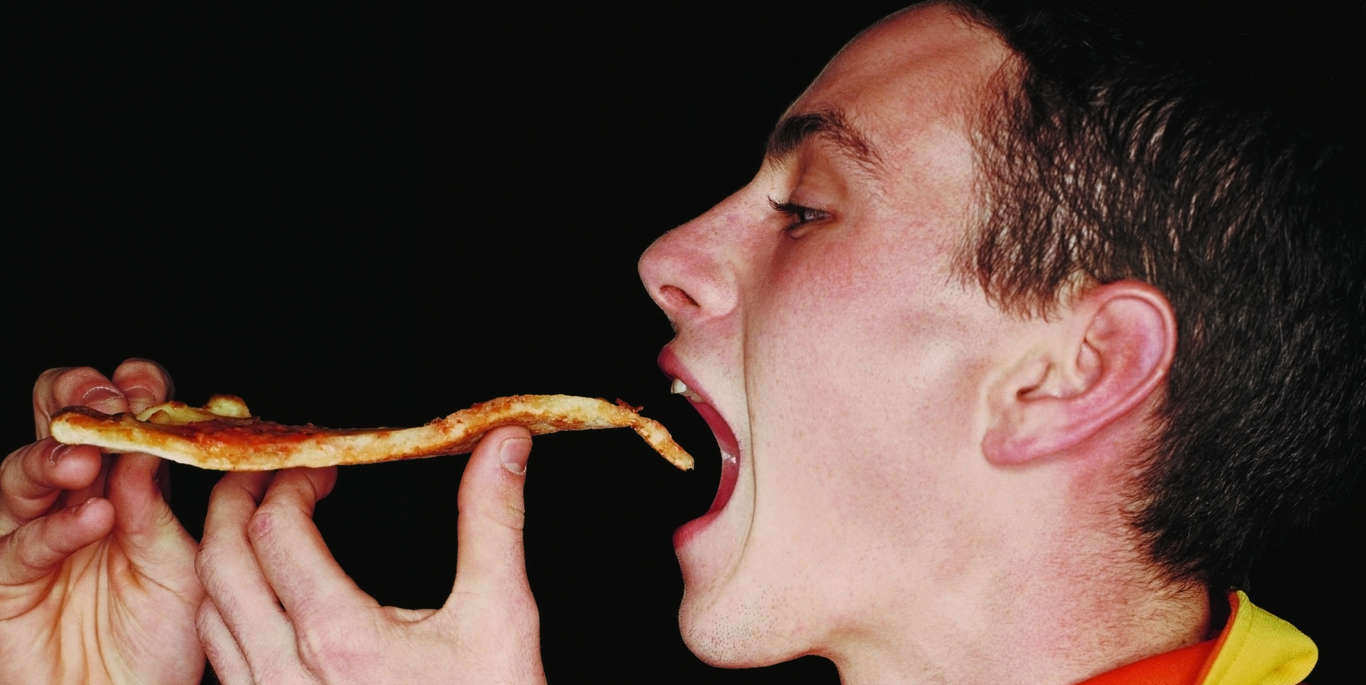You use the fast-food drive-through a couple of times a week, and your shopping cart is frequently stocked with cookies, pre-made doughnuts, ice cream, and potato chips, among other things (and dip). You, on the other hand, are frail. You’re running a lot, and you’re not gaining any weight, so everything is OK, right? Well, that’s not quite true. Put down the chocolate cupcake and give us a chance to explain ourselves. Unhealthy Diet, frequent fast-food restaurants, and stock up on cookies, packaged doughnuts, ice cream, and chips (and dip). But you are slim. You run a lot and don’t gain weight, so it’s all good, right? No way. Listen, put down the chocolate cupcake, Unhealthy Diet

A man-eating pizza, Close up: Think again if you think daily exercise entitles you to eat whatever you want. Experts offer nutrition tips for runners.
Runners are generally healthier than the general population, with lower rates of diabetes and heart disease, according to Sara Mahoney, Ph.D., chair of the department of exercise science at Bellarmine University. Runners generally take care of their bodies by eating well and resting.
But not all. Some of them eat only doughnuts and burgers. Running can help mitigate the negative health effects of this lifestyle. But exercise loses its protective powers over time.
Dave McGillivray, 63, learned the hard way. McGillivray, who has run the Boston course every year since 1973, used to log 90 to 120 miles a week and runs his age in miles on his birthday.
McGillivray began to feel out of breath at the start of workouts four years ago. He had severe coronary artery disease. “Hold on,” McGillivray said. “I’ve always run. Ironman Triathlons and 140 marathons. I ran across America. “How did I get blocked?”
McGillivray’s family had a history of chronic cardiac illness, and he ate like a teenager most of his life. “I just felt like if the furnace was hot enough, it would burn anything,” he says. “So I could eat whatever I wanted.”
Runners often adopt this attitude. A poll of Runner’s World Twitter followers found that half eat whatever they want because they run. In a recent survey of recreational ultrarunners, 62 percent did not follow the American College of Sports Medicine’s nutrition recommendations, despite knowing about them.
Having a healthy weight does not mean your diet isn’t causing internal harm. “I meet runners in their 50s and 60s who think they’ve done everything right in terms of health, but end up with heart disease. Aaron Baggish, M.D., director of the Cardiovascular Performance Program at Massachusetts General Hospital Heart Center and associate professor of medicine at Harvard Medical School, is McGillivray’s physician.
Diet is one of the most important aspects of an athlete’s health, but it is also one of the least understood, according to Baggish. Still, he calls simple sugar overconsumption “the most common dietary transgression among endurance athletes, especially runners.” He mentions white bread, pasta, rice, and sugar. Consume large amounts of these and the body transforms them into harmful molecules, fats, and sugar species that harm the heart vessels.
Runners often get mixed messages about how exercise, especially high-intensity workouts, can cure a junk-food addiction. According to a recent study by Christian Duval, Ph.D. of the Université du Québec à Montréal’s Department of Exercise Science, Duval fed a small group of men aged 18 to 30 breakfast sandwiches, burgers, fries, dessert, and soda for two weeks. Aside from the lack of vegetables, the subjects ate an abundance of saturated fats, sugar (which is worse than fat), and chemicals found in processed foods. Duval’s subjects didn’t gain weight because they did interval training. Moreover, he found no effect of the diet on fat accumulation and inflammation, which are key drivers of heart disease, cancer, and other chronic diseases.
But this study, which was widely reported, was only weeks long. A bad diet’s effects can take years to manifest. Consider atherosclerosis, which Baggish says develops slowly. “It’s a gradual process that starts when we’re young.” Symptoms don’t appear until the disease has advanced significantly. “
An unhealthy diet can’t be outrun. Bad diet choices will catch up with you, even if you exercise like a fiend.

